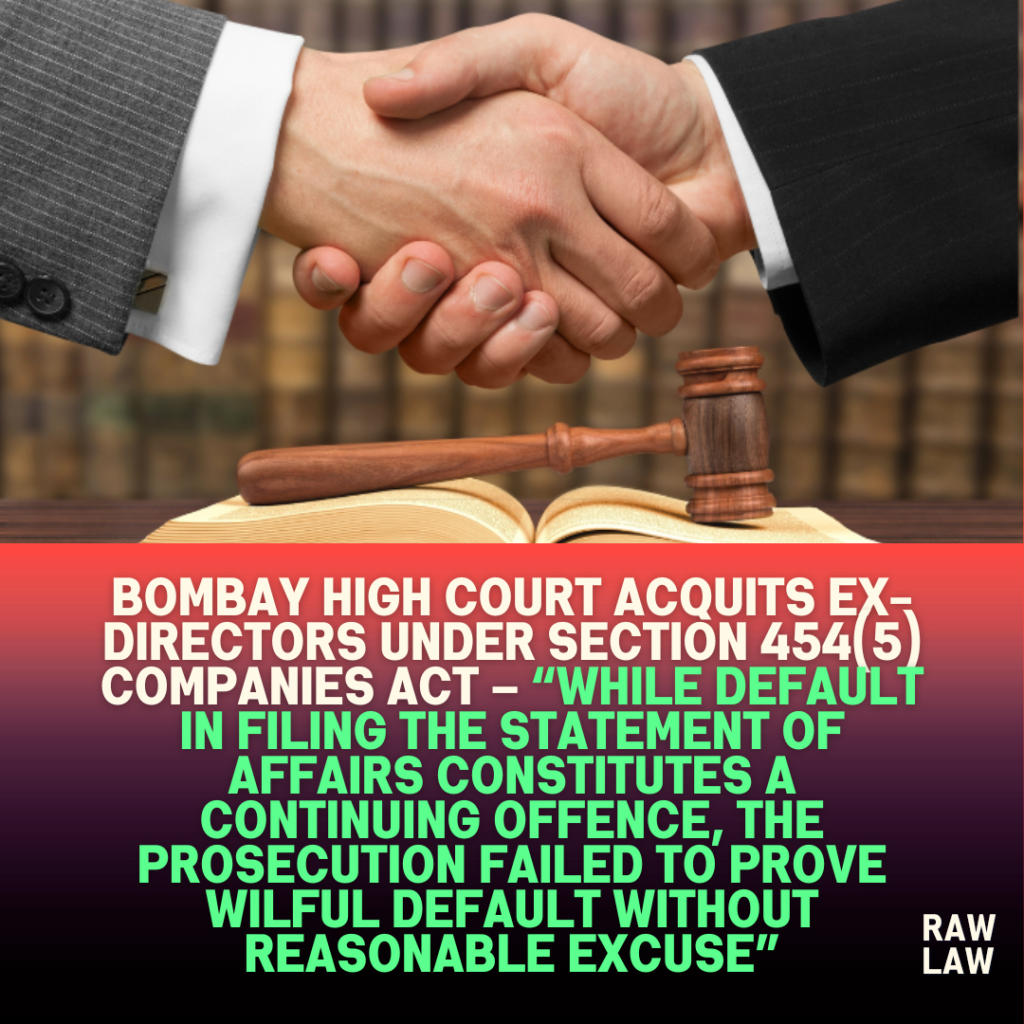Court’s Decision
The Bombay High Court acquitted the accused ex-directors of Geeta Marine Services Pvt. Ltd. (in liquidation) of charges under Section 454(5) of the Companies Act, 1956. The Court held that while default in filing the statement of affairs constitutes a continuing offence, the prosecution failed to discharge its burden of proving wilful default without reasonable excuse. It emphasized that the initial burden lies on the Official Liquidator to establish absence of reasonable excuse, and in this case, the evidence was insufficient to prove culpability beyond reasonable doubt.
Facts of the Case
Geeta Marine Services Pvt. Ltd. was ordered to be wound up by the Bombay High Court on 19 March 2009, with the Official Liquidator appointed as liquidator. The accused were ex-directors of the company at the time of winding up.
Under Section 454(1) and (3) of the Companies Act, they were obligated to submit a verified Statement of Affairs of the company within 21 days of the winding-up order (extendable to three months). Despite multiple directions of the Court (2009, 2010, 2012), the ex-directors allegedly failed to submit the statement of affairs in the prescribed form and to hand over the books of accounts and details of three barges linked to the company’s operations.
The Official Liquidator filed a criminal complaint in 2013 under Section 454(5) of the Act, punishable with imprisonment up to two years or fine of ₹1,000 per day of default.
Issues
- Whether the complaint filed in 2013 was barred by limitation under Section 468 CrPC.
- Whether failure to file the statement of affairs under Section 454 constitutes a “continuing offence.”
- Whether evidence by way of affidavit in lieu of examination-in-chief was admissible in a summons trial.
- Whether the prosecution proved beyond reasonable doubt that the accused committed wilful default “without reasonable excuse.”
Petitioner’s (Official Liquidator’s) Arguments
- The accused failed to submit the statement of affairs and concealed the whereabouts of three barges.
- The documents filed (balance sheets, bank statements, vouchers, etc.) were incomplete and not in prescribed format.
- Offence under Section 454 is a continuing offence, as default continues day to day until compliance.
- Filing of affidavit evidence was valid, since the accused did not object at the time and had cross-examined PW-1.
- Relied on precedents including Official Liquidator v. B.K. Bedi, Prabha P. Shenai v. Official Liquidator, and State of Bihar v. Deokaran Nenshi.
Respondent’s (Accused) Arguments
- The complaint was barred by limitation, as the default allegedly occurred in 2009, while the complaint was filed in 2013.
- Section 454 requires proof of default without reasonable excuse, but the complaint only alleged “without reasonable cause.”
- Evidence by affidavit in a summons trial was inadmissible under Sections 273 and 296 CrPC, as PW-1 had no personal knowledge and deposed only from records.
- Notices in prescribed Form 55 were never served, making liability unenforceable.
- Accused no.2 had resigned in 2005, prior to winding up, and could not be held liable.
Analysis of the Law
- Limitation: The Court held that failure to file statement of affairs is a continuing offence under Section 454. Relying on Deokaran Nenshi and Globe Associates v. F.C. Mehra, it ruled that every day of default gives rise to a fresh cause, hence the 2013 complaint was within limitation.
- Evidence by Affidavit: Though ordinarily inadmissible in summons trials, the Court applied R.V.E. Venkatachala Gounder v. Arulmigu Temple to hold that since the accused did not object when affidavit was tendered, they waived the objection. The evidence stood admitted.
- Burden of Proof: The Court clarified that the essential ingredient of Section 454(5) is wilful default without reasonable excuse. The prosecution bore the initial burden to prove absence of reasonable excuse by showing that records were available but not used. Only thereafter would the burden shift to the accused under Section 106 Evidence Act.
Precedent Analysis
- State of Bihar v. Deokaran Nenshi – Defined continuing offences; applied to hold Section 454 creates a continuing wrong.
- Maya Rani Punj v. CIT – Default in filing returns under Income Tax Act treated as continuing offence; analogy applied.
- P.V.R.S. Manikumar v. Official Liquidator (Madras HC) and Vertex Stock & Shares v. Vemuri Rao (Telangana FB) – Initial burden on prosecution to prove absence of reasonable excuse.
- Official Liquidator v. B.K. Bedi (Delhi FB) – Default is without reasonable excuse if records available but not used.
- Shambu Nath Mehra v. State of Ajmer – Section 106 Evidence Act cannot relieve prosecution of its burden.
Court’s Reasoning
- The prosecution’s sole witness (PW-1) deposed only from records and admitted lack of personal knowledge.
- Exhibit P-14 showed that the accused had forwarded balance sheets and documents, claiming these as statement of affairs. PW-1 admitted this letter was misplaced.
- Later filings in 2014 and 2015 (Exhibits P-18, P-19) showed statement of affairs were eventually submitted, albeit incomplete.
- Prosecution failed to prove that records were available with accused and that failure was wilful.
- Mere defects in format or incomplete statements cannot constitute wilful default under Section 454(5).
Conclusion
The Court held:
- Offence under Section 454 is a continuing offence until statement of affairs is filed.
- However, prosecution failed to prove wilful default without reasonable excuse.
- The benefit of doubt was extended to the accused, who were acquitted.
Implications
The judgment clarifies that while directors remain continuously liable until they file the statement of affairs in winding-up proceedings, criminal liability under Section 454(5) arises only if wilful default is proved beyond reasonable doubt. It strengthens directors’ protection against prosecution based merely on procedural lapses and underscores the heavy burden on Official Liquidators in criminal complaints.



